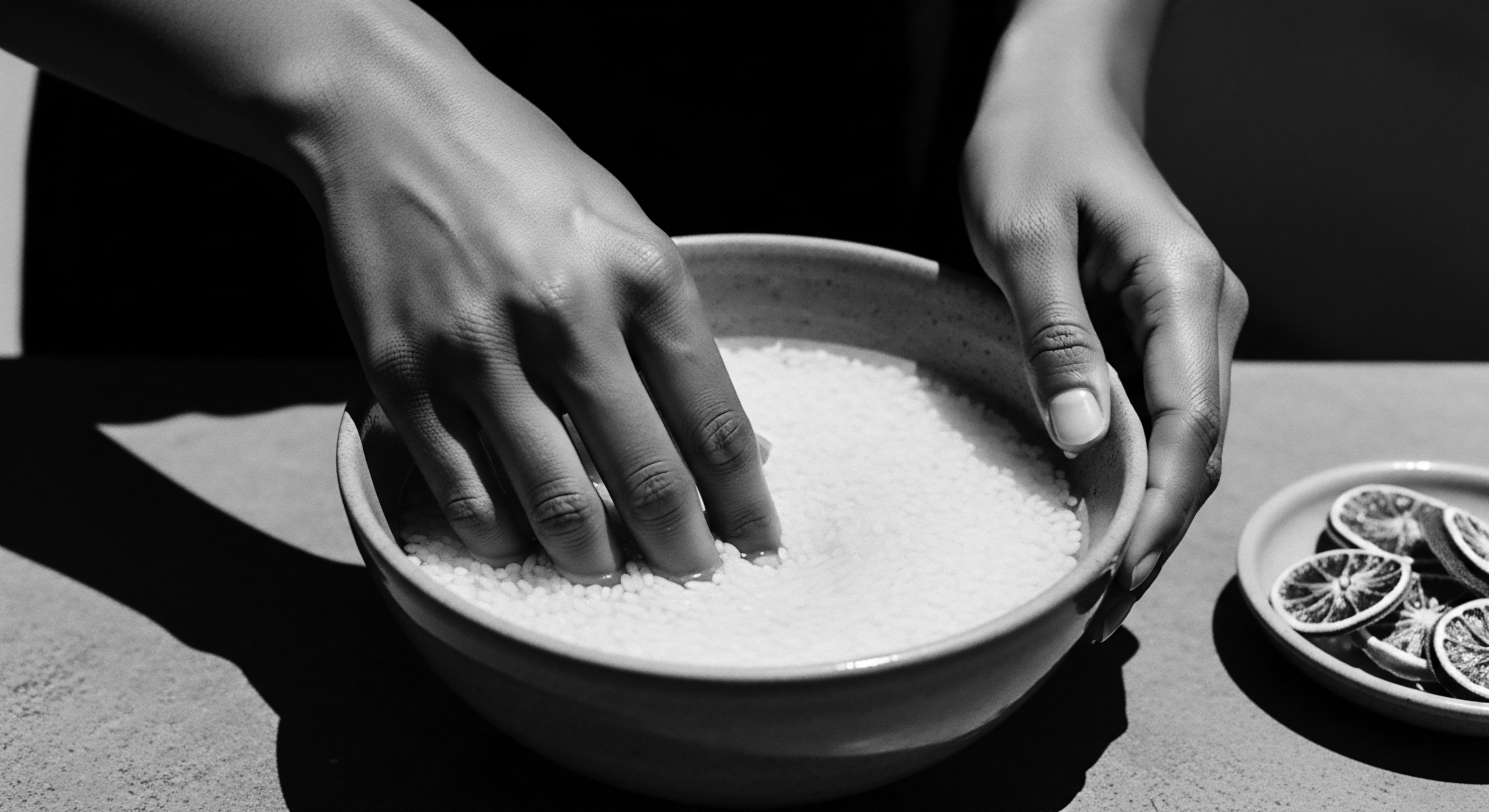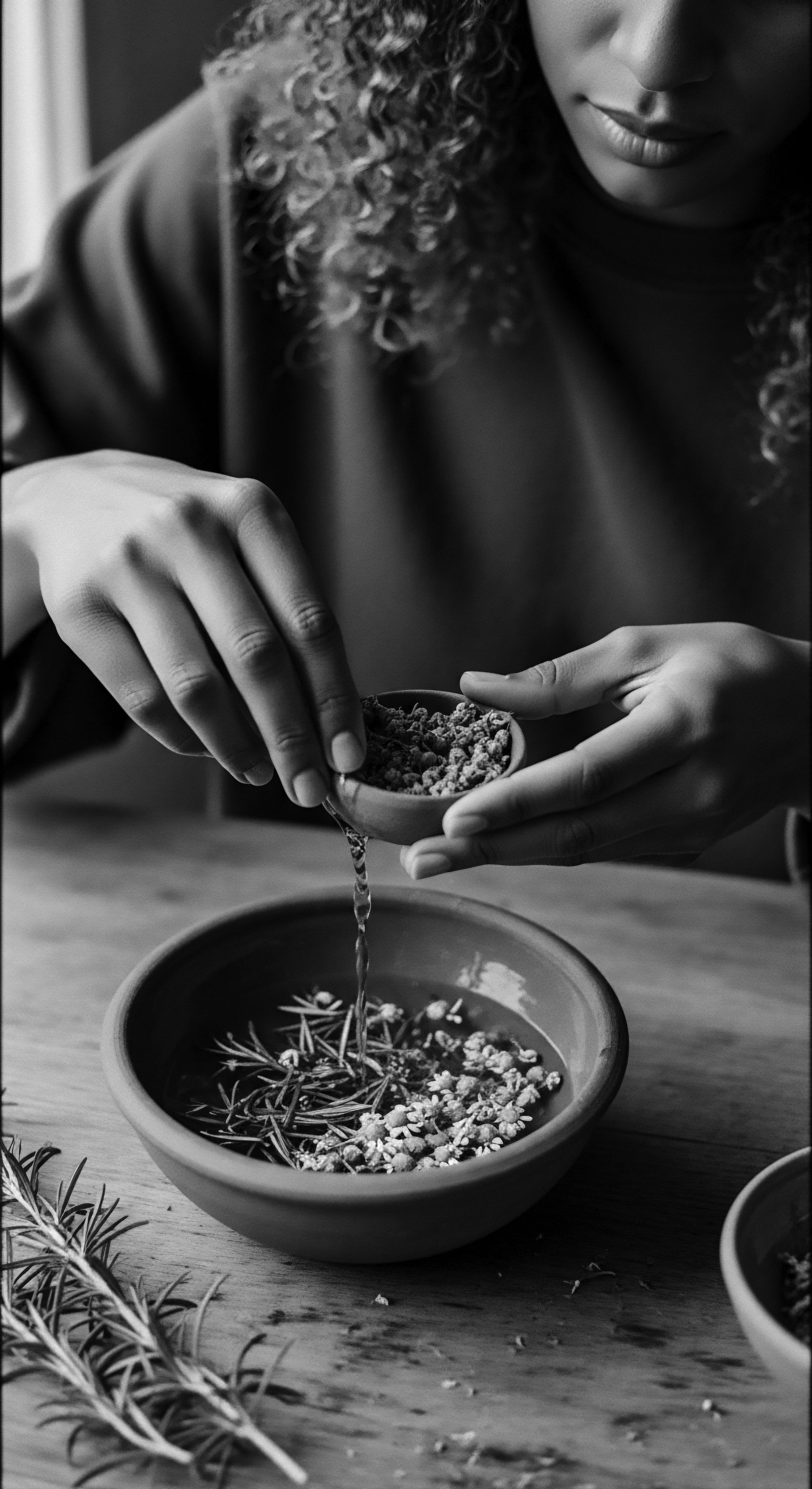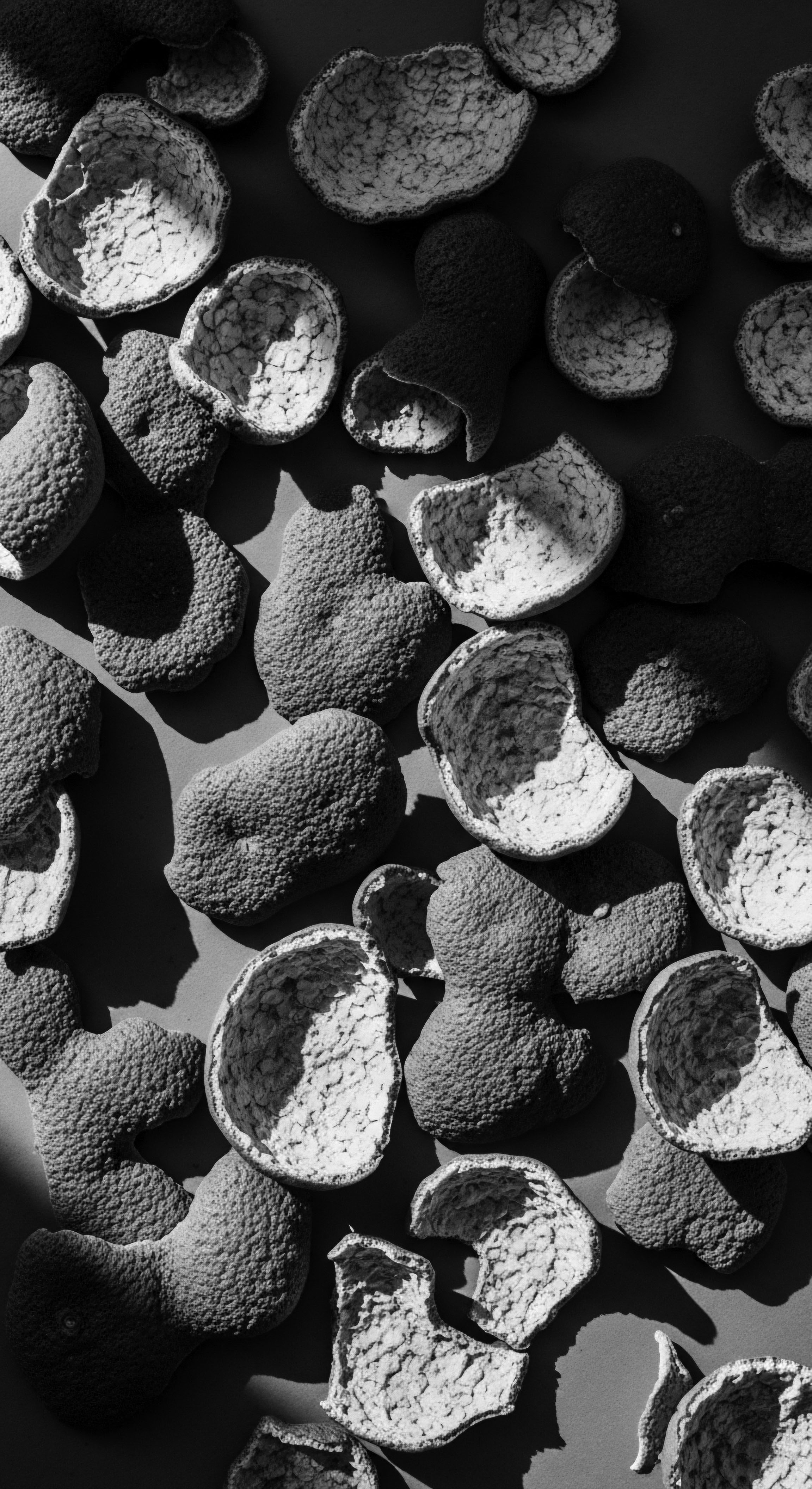
Fundamentals
The concept of Scalp Health Water, at its most elemental understanding, points to the mindful use of water for the nourishment and cleanliness of the scalp, particularly for those with textured hair. This is not a manufactured product or a single formulation, but rather a profound recognition of water’s indispensable role as a primary medium for care. It acknowledges water as the fundamental agent that allows the scalp, the very soil of our hair, to flourish.
From the simplest rinse to more elaborate preparations, this understanding frames water not just as a cleanser, but as an active participant in maintaining the delicate balance required for robust hair growth and vibrant scalp vitality. Its designation extends beyond mere liquid to encompass the purposeful interaction with water, reflecting an ancestral wisdom that instinctively grasped its significance for hair well-being.
For individuals with textured hair, water possesses particular importance. The coiled and kinky structures of these strands can make natural oils from the scalp, known as sebum, slower to descend the hair shaft, leaving the scalp vulnerable to dryness or buildup. Conversely, textured hair can also be prone to losing moisture rapidly.
The precise application and preparation of water become central to addressing these specific needs, ensuring that the scalp receives adequate hydration without becoming oversaturated or stripped. This recognition of water’s dual capacity ❉ both to cleanse and to moisturize ❉ forms a foundational layer of understanding within the broader landscape of hair care.
The elementary clarification of Scalp Health Water traces back to human ingenuity. Before commercial products existed, people utilized the resources around them to maintain personal hygiene and health. Water, universally accessible, became the obvious choice for cleansing and preparing the scalp for other treatments. Its early applications were likely empirical, with communities observing the beneficial effects of different water sources or water infused with local botanicals.
This rudimentary yet powerful appreciation for water’s role in sustaining the scalp’s ecosystem represents an early, intuitive form of hair wellness advocacy. The statement and its intrinsic meaning begin with these primal connections.
Scalp Health Water signifies the deliberate and thoughtful application of water, often enhanced by natural elements, to cultivate a flourishing environment for textured hair.
Understanding Scalp Health Water at this foundational level encourages a return to simplicity. It asks us to consider what our ancestors knew without scientific instruments: that water, pure and purposefully applied, holds a key to vitality. This early awareness forms the descriptive bedrock for all subsequent, more complex understandings of scalp care. It is a delineation that prioritizes fundamental elements over complicated formulations, underscoring water’s intrinsic value in hair traditions.
Across various cultures, particularly those with deep roots in natural living, water was, and continues to be, held in high regard for its purifying and restorative qualities. The concept of Scalp Health Water, therefore, is not a new invention, but rather a contemporary naming of an ancient practice. It underscores a timeless relationship between humanity, natural elements, and the quest for well-being. This explication highlights water as a conduit for health, serving as both a physical agent and a symbolic presence in rituals of care for the scalp.
The earliest forms of scalp care universally involved some interaction with water. Whether it was rinsing away dust and debris, or softening the scalp for manipulations, water served as the primary tool. This basic recognition evolved as humans began to understand that water could also carry other beneficial properties when combined with specific plants or minerals.
- Softening Agent ❉ Water’s capacity to soften the outermost layer of the skin on the scalp, the stratum corneum, allowing for better absorption of oils and treatments.
- Cleansing Medium ❉ Its natural ability to rinse away dirt, product buildup, and shed skin cells from the scalp surface and hair follicles.
- Carrier for Nutrients ❉ Water serves as a vehicle to transport beneficial compounds from herbal infusions or other natural remedies directly to the scalp.
- Hydrating Element ❉ Direct application of water provides essential moisture, especially critical for moisture-retentive textured hair.

Intermediate
Moving beyond the rudimentary understanding, the intermediate interpretation of Scalp Health Water begins to untangle the intricate relationship between water quality, its preparation, and its direct impact on the unique physiology of textured hair. This level of comprehension acknowledges that not all water is created equal, and ancestral communities, through generations of observation, understood these subtle distinctions with a remarkable degree of precision. It speaks to a more intentional engagement with water as a specialized medium for scalp care, moving from simple cleansing to targeted application for health and resilience.
The significance of water’s mineral composition, for instance, became apparent through lived experience. Hard water, rich in minerals like calcium and magnesium, can deposit residues on the scalp and hair, leading to dryness, dullness, and a sensation of itchiness. Conversely, soft water, with lower mineral content, can cleanse more efficiently, leaving the scalp feeling supple and responsive.
Traditional communities, though without chemical assays, noted these differences through tactile experiences and the observed health of hair, adapting their practices accordingly. This forms a more sophisticated description of the meaning of Scalp Health Water.
Furthermore, the temperature of water, its purity, and the methods of its collection or treatment held specific implications. Cool or lukewarm water was often favored for cleansing, as it avoided stripping the scalp of its natural oils while still facilitating debris removal. The purposeful collection of rainwater, for example, was a practice born from an intuitive recognition of its relatively soft nature and inherent purity, free from the sediments and harsh minerals often found in ground sources. This thoughtful procurement underscores a deep connection to the natural world and a refined understanding of its gifts for scalp well-being.
At an intermediate level, Scalp Health Water represents a conscious selection and preparation of water, attuned to its properties and the unique requirements of textured hair.
Traditional methods of enhancing water for scalp care also become more prominent at this stage of understanding. The practice of infusing water with herbs, barks, or roots ❉ creating decoctions or rinses ❉ was not merely symbolic. It was a pragmatic application of ethnobotanical knowledge, where water acted as a solvent to extract beneficial compounds.
Think of the historical uses of plants like Moringa oleifera , indigenous to Africa, whose leaves, pods, and seeds were historically steeped or boiled in water to create remedies for various skin and scalp conditions, given its rich vitamin, mineral, and antioxidant profile (Origenere, 2024; Afrika Botanicals, 2023). This ancient practice, refined through generations, turned simple water into a targeted therapeutic agent, addressing specific scalp concerns such as dryness, irritation, or supporting growth.
This level of understanding also encompasses the cultural rituals surrounding water and scalp care. The act of preparing these infused waters, the communal aspect of hair dressing, and the stories passed down through generations about the potency of certain waters or herbs, all deepen the meaning of Scalp Health Water. It transitions from a merely biological concept to a deeply cultural one, where the water, in its prepared form, becomes a living testament to collective wisdom and shared heritage. The elucidation here recognizes the intergenerational transfer of nuanced knowledge.
The practice of creating herbal rinses or decoctions for the scalp has deep roots in African traditions. These preparations often involve:
- Boiling Botanicals ❉ Leaves, barks, or roots of specific plants were boiled in water to extract their medicinal properties.
- Cooling and Straining ❉ The infused water was then cooled and strained to remove plant matter, creating a clear liquid.
- Application ❉ This prepared water was then used as a final rinse, a scalp massage liquid, or a compress to address scalp issues or to condition hair.
This methodical approach highlights an early understanding of water as a dynamic component, capable of carrying and delivering beneficial substances directly to the scalp. The delineation of Scalp Health Water at this stage bridges traditional knowledge with an incipient, empirical science, demonstrating a sophisticated approach to care that was both intuitive and effective.
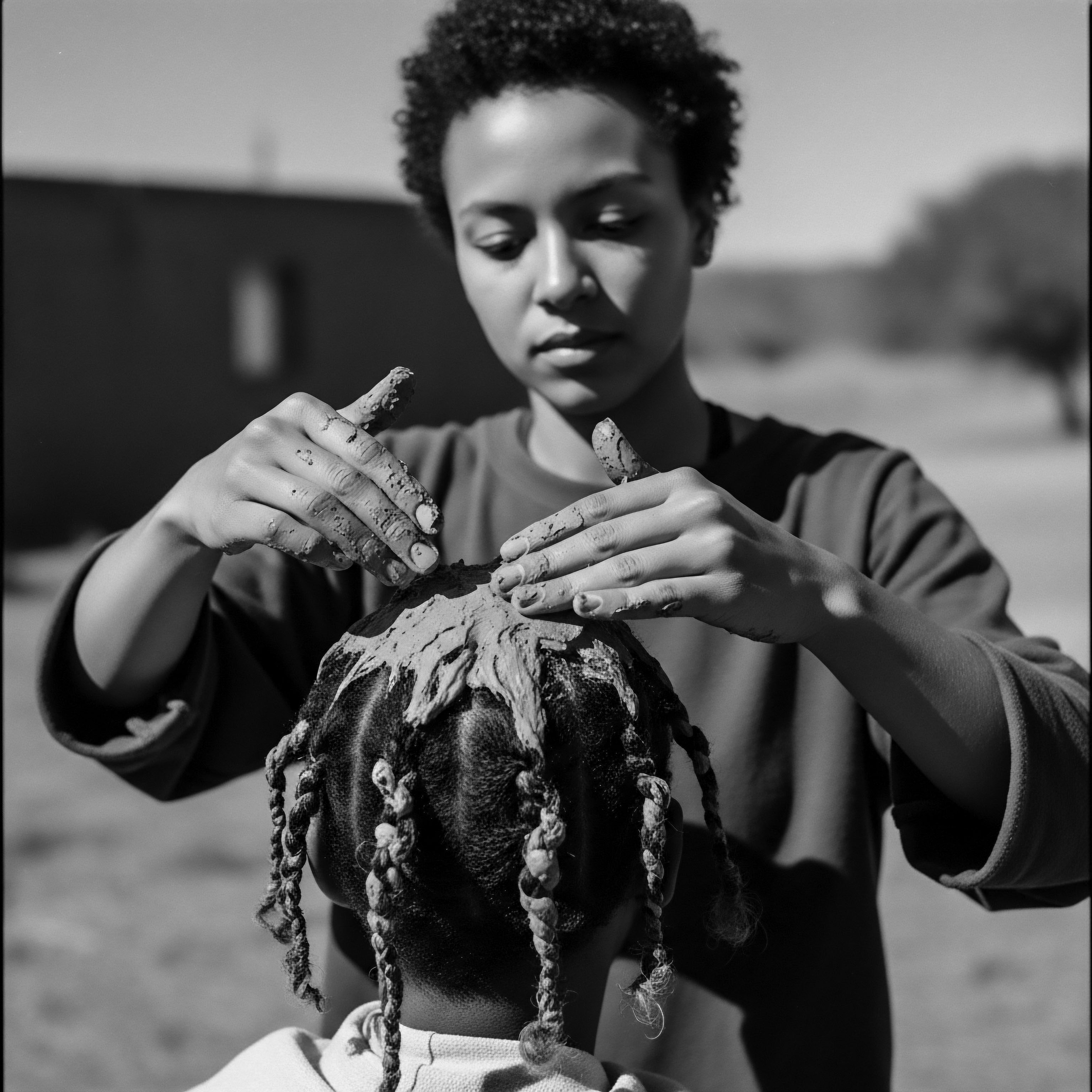
Academic
The academic definition of Scalp Health Water transcends rudimentary and intermediate understandings, crystallizing into a comprehensive concept that unifies ethno-dermatology, hydrologic science, and the profound cultural epistemologies of Black and mixed-race hair heritage. It is a rigorous interpretation that recognizes water not as a passive element, but as a critical bio-cosmetic agent, meticulously selected and often transformed to exert specific therapeutic effects on the scalp’s microbiome, epidermal barrier, and follicular dynamics. This delineation acknowledges the long-term consequences of water quality and treatment on hair resilience and overall scalp vitality, particularly within populations whose hair textures inherently demand a delicate moisture balance. The designation, viewed through an academic lens, encapsulates the ancestral mastery of environmental resources for profound physiological and cultural well-being.
This expert-level understanding begins with a precise examination of water’s physicochemical properties. The pH of water, its alkalinity or acidity, significantly influences the scalp’s acid mantle, a protective barrier with a pH around 5.5. Deviations from this optimal range can compromise barrier function, leading to conditions such as dryness, irritation, or increased susceptibility to microbial imbalances. The mineral content, often measured as water hardness, dictates the potential for mineral deposits on the scalp and hair, which can obstruct follicular openings, impair natural sebum flow, and cause textural changes in the hair shaft, diminishing its innate softness and elasticity.
The presence of chlorine or other purifying agents in treated water, while necessary for public health, can also strip the scalp of its protective lipids, leading to a compromised epidermal barrier. The meaning of Scalp Health Water, academically considered, therefore involves an informed decision-making process concerning these variables.
Furthermore, the academic perspective integrates the intricate biomechanics of textured hair with water interaction. Highly coiled hair strands possess numerous points of flexion, making them inherently more susceptible to mechanical stress and breakage, especially when dry or improperly moisturized. Water, when correctly applied, can temporarily swell the hair shaft, making it more pliable and reducing friction during manipulation.
The strategic use of water, often accompanied by emollients or humectants, ensures that the scalp remains hydrated, promoting an environment conducive to healthy hair growth and mitigating common concerns like flaking, itching, or tension-induced scalp discomfort. This expert insight into the interplay between water and specific hair structures provides a deeper conceptualization.
Scalp Health Water, academically defined, is the informed, strategic application of water, calibrated by its physicochemical properties and enhanced by targeted compounds, to optimize the physiological landscape of the scalp for textured hair.
A powerful example illuminating this academic interpretation, particularly in the context of enduring heritage, lies in the resourceful ingenuity displayed by enslaved African women in the Americas. Stripped of traditional tools and ingredients, facing harsh conditions and inadequate hygiene provisions, these women sustained scalp and hair health through remarkable adaptation. They did not have access to clean, potable water for routine personal care, let alone for the elaborate rituals of their homeland. Instead, they often relied on collected rainwater or other available, often stagnant, sources.
Despite these profound limitations, their inherited knowledge, passed down through whispers and tactile instruction, guided them to prepare these waters to minimize harm and even to confer therapeutic benefit. They would often infuse collected water with foraged botanicals, kitchen discards, or even ashes, creating rudimentary decoctions or rinses for cleansing and conditioning. While direct academic quantification is challenging, historical scholarship consistently references the adaptive practices that arose from extreme deprivation. Deborah Gray White’s seminal work, Ar’n’t I a Woman?: Female Slaves in the Plantation South, although primarily focused on the social and economic lives of enslaved women, speaks implicitly to their pervasive resilience and adaptive strategies in all aspects of self-maintenance amidst unimaginable duress.
This resourcefulness, transforming scarce resources into functional ‘Scalp Health Water,’ stands as a poignant testament to the profound connection between ancestral wisdom, environmental literacy, and the enduring quest for well-being. The clarification here is that Scalp Health Water was not merely about access, but about transformation and intelligent application under dire circumstances.
The long-term consequences of such practices are profound. The consistent application of prepared, beneficial waters contributed to the overall health of enslaved populations, reducing scalp infections, minimizing breakage, and offering a measure of dignity and self-determination in circumstances designed to deny both. This historical example underscores the inherent power of Scalp Health Water as a concept of resilience, where knowledge of water’s properties, coupled with deep botanical understanding, allowed for survival and cultural continuity. The essence of Scalp Health Water, from this vantage, is a living legacy of adaptation and persistent care.
From a contemporary academic viewpoint, the components of optimal Scalp Health Water can be meticulously analyzed:
- pH Balance ❉ Water with a slightly acidic pH (4.5-5.5) helps to maintain the scalp’s natural acid mantle, inhibiting the growth of pathogenic bacteria and fungi, thereby promoting a balanced microbiome.
- Mineral Profile ❉ Water with minimal mineral content (soft water) prevents the accumulation of residues that can clog follicles and leave hair brittle. Demineralized or distilled water can be advantageous for sensitive scalps or those prone to buildup.
- Botanical Infusion Efficacy ❉ The science of phytochemistry validates ancestral practices, demonstrating how water acts as a polar solvent to extract water-soluble compounds (e.g. flavonoids, saponins, tannins) from herbs. These compounds can offer anti-inflammatory, antimicrobial, antioxidant, or astringent properties beneficial for the scalp.
- Osmotic Regulation ❉ Understanding how water moves across cell membranes on the scalp allows for the formulation of rinses or treatments that hydrate without over-saturating, preventing transepidermal water loss and maintaining barrier integrity.
The advanced analysis of Scalp Health Water also delves into its multi-cultural dimensions, recognizing that while the fundamental principles may be universal, their applications and cultural significances vary. In many Indigenous African societies, water for bathing and hair care was often sourced from sacred rivers or collected during specific lunar phases, imbued with spiritual potency. This metaphysical dimension of water, as a vehicle for blessings or connection to ancestors, adds another layer to its definition, moving beyond mere chemical composition to encompass a holistic perception of wellness.
Consider the use of particular botanical species in Africa, where neem (Azadirachta indica) , despite its Asian origin, became deeply integrated into traditional medicine. Water infused with neem leaves was, and continues to be, utilized for its antiseptic properties, addressing scalp infections and promoting a healthier environment for hair growth. The specific methods of preparing these infusions, their frequency of use, and the accompanying rituals represent sophisticated, localized ecological knowledge that warrants thorough academic inquiry. The long-term success of such practices provides compelling data on ancestral epidemiological observations.
The expert academic perspective seeks to synthesize these historical, cultural, and scientific facets, creating a comprehensive understanding of Scalp Health Water. It encourages research into traditional preparations, validating their efficacy through modern analytical methods, and exploring how these ancient practices can inform contemporary hair care. This sophisticated interpretation of the term challenges a reductionist view, insisting on a holistic approach that honors both empirical data and inherited wisdom. The intention of this conceptualization is to provide a complete, interconnected exploration.
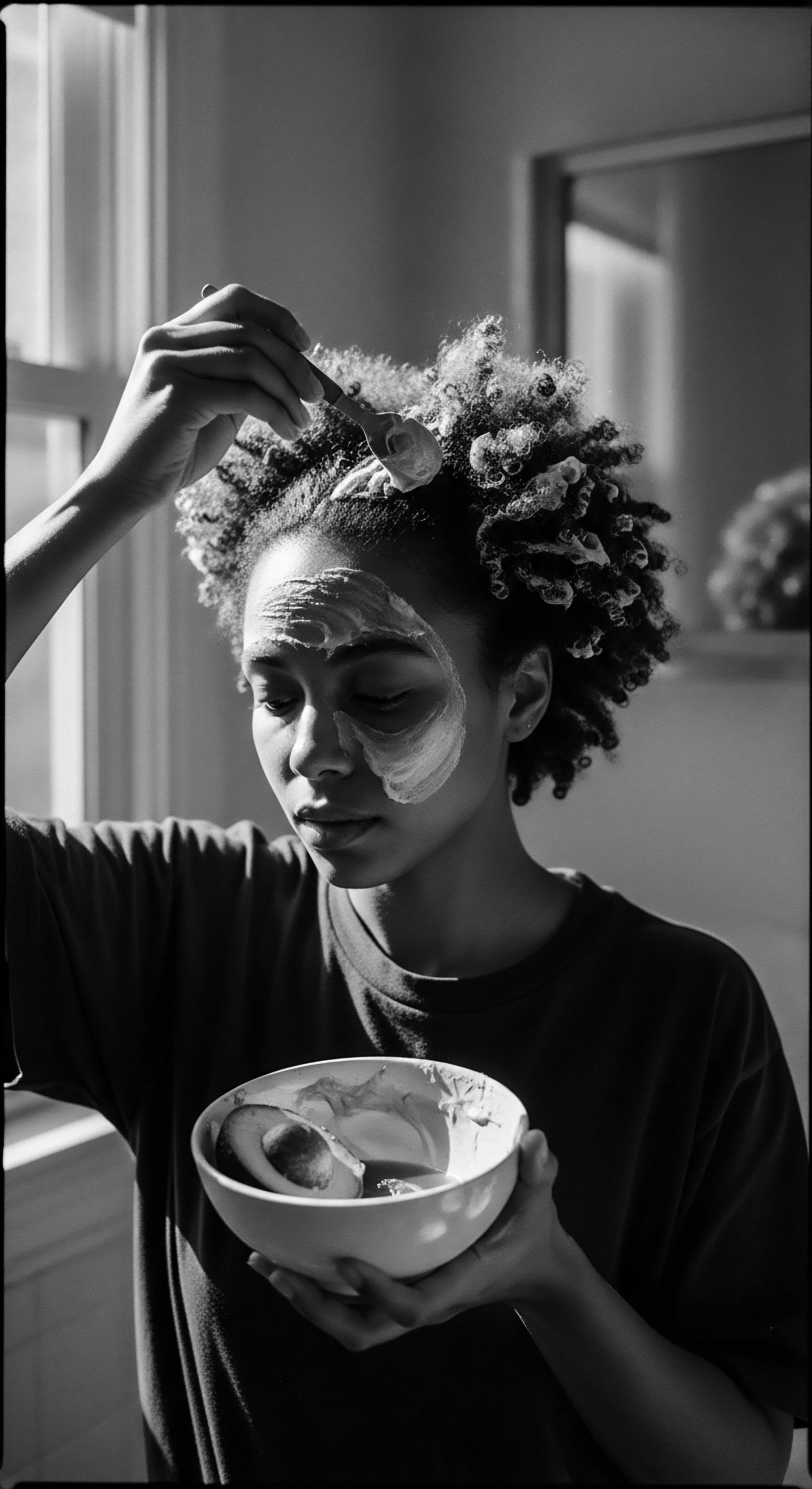
Reflection on the Heritage of Scalp Health Water
The journey through the meaning of Scalp Health Water reveals more than a simple definition; it unveils a profound meditation on the enduring wisdom embedded within textured hair heritage. From the elemental biology of water’s interaction with the scalp, through the living traditions of care and community, to its role in voicing identity and shaping futures, this concept truly breathes as a living archive of knowledge. It invites us to consider how our ancestors, with an innate scientific sensibility, discerned the vital properties of water and harnessed them for well-being.
Their practices, whether involving the gentle collection of rainwater or the meticulous infusion of botanicals, were not merely acts of grooming; they were acts of survival, self-preservation, and profound cultural expression. The continuous thread of care, passed from hand to hand, from generation to generation, forms a legacy of resilience.
This deep exploration of Scalp Health Water compels us to honor the knowledge systems that persisted despite immense challenges. The ingenious adaptations of enslaved African women, transforming scarce resources into potent elixirs for scalp vitality, stand as a testament to the unbound helix of ancestral wisdom ❉ a spiraling narrative of ingenuity that refused to be severed. Their understanding of water, its limitations and its possibilities, was both pragmatic and deeply spiritual, recognizing that true care flowed from an intimate connection to the earth and its gifts.
To grasp Scalp Health Water is to acknowledge a sacred contract with the past. It is an invitation to listen to the whispers of grandmothers who knew which plants softened and which purified, which waters cleansed deeply and which hydrated tenderly. It speaks to the holistic well-being that connects the physical vitality of the scalp to the spiritual health of the individual and the collective. Our hair, indeed, is an extension of our soul, and the water we use to tend it becomes a conduit for ancestral blessings.
As we look towards the future, the concept of Scalp Health Water holds immense promise for sustainable, culturally congruent hair care. It beckons us to look beyond fleeting trends and commercial promises, urging a return to the foundational elements and the inherited wisdom that has sustained textured hair for millennia. By embracing this deep knowledge, we not only nurture our scalps; we honor a heritage that continues to flow, vibrant and unbound, through every single strand. The spirit of this practice reminds us that the most potent solutions often lie in the elemental, in the ancient, and in the profound respect for what the earth provides.
The heritage of Scalp Health Water is a testament to ancestral ingenuity, where elemental care became a powerful act of cultural preservation and enduring vitality.
The echoes from the source, the tender thread of communal care, and the unbound helix of identity all converge within the understanding of Scalp Health Water. It is a concept that truly links the biological reality of our scalps to the rich tapestry of our shared human story, emphasizing that authentic wellness is always rooted in profound connection.
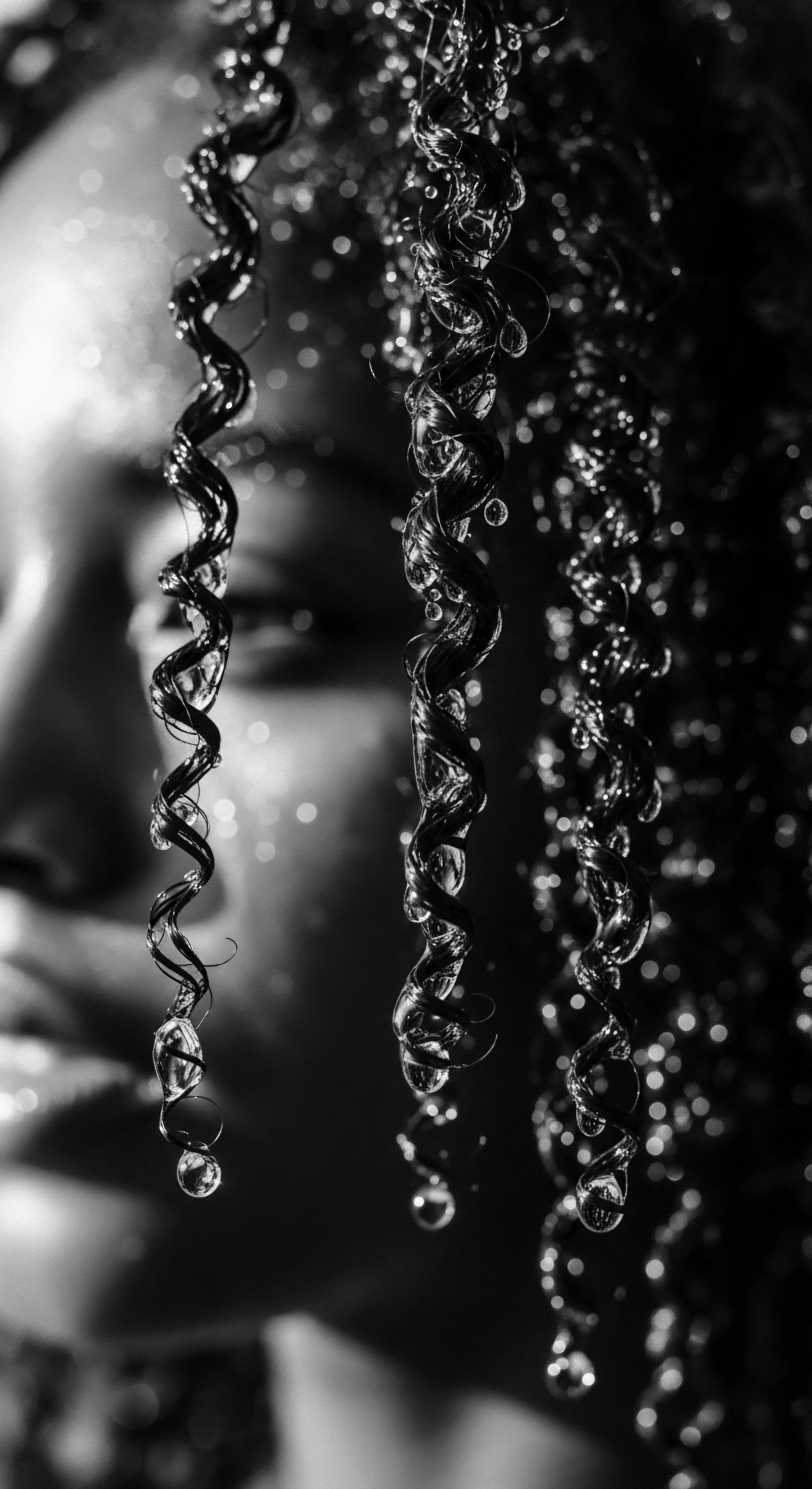
References
- Afrika Botanicals. (2023). Moringa Seed Oil.
- Deborah Gray White. (1985). Ar’n’t I a Woman?: Female Slaves in the Plantation South. W. W. Norton & Company.
- Isha Foundation. (2021). Neem Leaves: 7 Amazing Benefits & 6 Medicinal Uses.
- Origenere. (2024). Moringa Benefits For Hair: Unlock the Magic.
- The Times of India. (2024). How to consume Moringa for hair growth.
- Good Health by Hims. (2025). Moringa Oil for Hair: Benefits, Uses, and Alternatives.
- Green Views Residential Project. (2022). Neem, a miracle plant with multiple benefits.
- Fushi Wellbeing. (2021). Three popular African Oils: Marula, Baobab and Moringa.
- Body Revival By Health Reactive. (n.d.). Neem Plant ❉ Information With Benefits of Leaves, Oil & Bark.
- Senior Seminar on Animal Health. (n.d.). Review on Medicinal Value and other Application of Neem Tree.
- Infonet Biovision Home. (n.d.). Neem.
- Substack. (2025). Ancestral Hair Rituals to Nourish Your Hair and Soul.
- Yao Secret. (2023). Fermented Rice Water For Hair: History and Get it Now.

